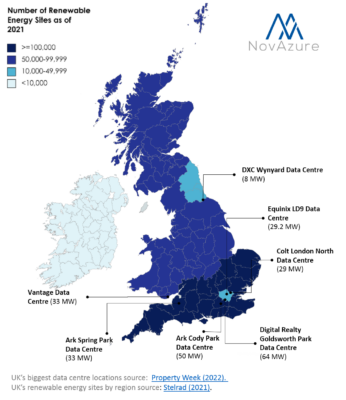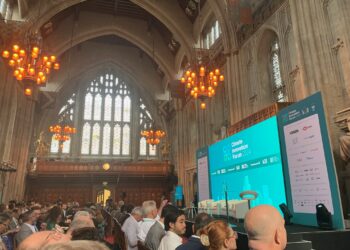Geographical Disparity in UK Data Centres and Renewable Energy Sources
Data centres in the UK might face a challenge due to the mismatch between renewable energy sources and the locations of data centres. Despite Scotland’s abundant renewable power capacity, the presence of large-scale data centres in the region remains relatively limited. This highlights the potential for data centres to harness Scotland’s renewable energy resources and contribute to the overall sustainability goals of the country. Meanwhile, despite London’s prominence as a major data centre hub, it only represents a mere 2.95% of the country’s total renewable energy sites (See Figure). This geographical disparity poses logistical and transmission hurdles.

Considerations for Future Data Centre Planning
Planning of future data centre facilities demands consideration of many important factors impacting upon the ‘ideal’ location:
- the availability of sustainable supplies of energy and water
- the need for minimisation of data latency
- accommodating the hotter and faster chips of an AI/HPC future
- responding to accelerating legislation, including embargoes on the granting of planning permits
- the need for the industry to cut GHG emissions by 50% by 2030 when, at the same time, demand for new data centres is increasing exponentially.
Challenges of Locating Data Centres in London
Locating in the data centre hub of London addresses the issue of latency. But legislation means that obtaining planning permits for a new data centre may be impossible. There is no spare capacity in the energy and water supply for major new projects of commercial development or housing. A typical data centre uses the power equivalent to 3 average-sized hospitals. Water companies are seeking cuts in water demand of up to 85% for new data centres.
Moreover, locating data centres farther from the renewable energy source can potentially increase the chance of transmission losess. Conventional electricity transmission involves converting between alternating current (AC) and direct current (DC). Although AC power is the most common kind of electricity generated at power plants,applications such as data centres function more efficiently on direct current (DC). This AC-DC conversion process results in energy losses. The UK’s Department for Energy Security & Net Zero reported a distribution loss factor of approximately 1.102 in 2022, indicating around 9% of electricity loss during transmission. The greater the distance between the power generation and the end user, the larger the transmission losses experienced in the electrical grid.
In the UK, National Grid plans to connect 15GW of new power supplies from offshore wind turbines in the North Sea via East Anglia to London. Legal and planning hurdles will likely be significant.
Benefits and Drawbacks of Proximity to Renewable Energy Sources
Locating data centres near renewable energy sources can reduce transmission losses and allow the industry to tap into areas with abundant renewable energy. The main drawback of this approach is that it may increase latency and slow down data transfer. Moreover, if the renewable energy source is located in a remote area, it can limit data centres’ access to reliable connectivity and a skilled workforce. Nevertheless, some start-ups have begun to explore this approach. Earth, Wind and Power, a Norwegian company, is developing mobile data centres in containers that are designed to be located near renewable sources. The company uses surplus renewable energy to power modular data centres, promoting resource efficiency while providing a market for excess energy to early-stage renewable projects.
As the industry aims to cut GHG emissions while addressing growing demand, careful consideration of how and where to grow will be crucial. At NovAzure, we’re helping our clients to understand the total cost of ownership implications of some of the constraints and opportunities, to support better decisions managing their future data centres portfolio. For further discussion, feel free to contact Philip Cholerton, Partner (p.cholerton@novazure.com), and Jean-Jacques Jouanna, Managing Director (jjouanna@novazure.com) for an initial chat to understand your needs and how we can help you achieve your goals.





